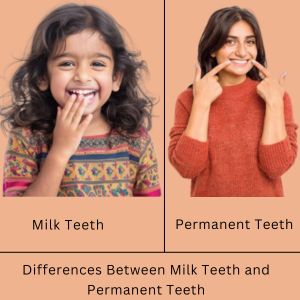Milk teeth are the first set of teeth that children develop, typically starting to appear around the age of six months. These teeth, also called baby teeth or primary teeth, are essential for early development, including the ability to chew and speak. By the age of three, most children will have a full set of 20 milk teeth, which will gradually fall out as permanent teeth emerge.
Permanent teeth, also known as adult teeth, are the second set of teeth that begin to appear around the age of six and continue to emerge throughout childhood and adolescence. By the age of 21, most people have a full set of 32 permanent teeth, which replace the 20 milk teeth.
Milk teeth are smaller and weaker, designed for early development. Permanent teeth, on the other hand, are larger, stronger, and built to last through adulthood.
Children typically have 20 milk teeth, whereas adults have 32 permanent teeth (including wisdom teeth).
Milk teeth eventually fall out and are replaced by permanent teeth, while permanent teeth are meant to last a lifetime with proper care.
The enamel of permanent teeth is much thicker and more durable, providing better protection against cavities and damage than the thinner enamel of milk teeth.
Milk teeth are more susceptible to decay due to their thinner enamel and smaller size. Permanent teeth are more resistant to decay if well cared for, though they can still be vulnerable to cavities without proper oral hygiene.
The roots of milk teeth are shorter, making them easier to fall out, while permanent teeth have longer roots that anchor them firmly in place.
Milk teeth molars have fewer cusps and are smaller, while permanent molars have more cusps and are larger for grinding food.

Milk teeth often have more space between them, which helps the permanent teeth emerge without crowding, while permanent teeth are usually closely spaced.
Losing milk teeth doesn’t affect functionality as much because permanent teeth take their place, whereas losing a permanent tooth requires replacement to maintain proper function.
Milk teeth are more sensitive to temperature changes compared to the more robust permanent teeth.
Both milk and permanent teeth aid in speech, but milk teeth play a more significant role in developing speech patterns in children as they form the foundation for adult teeth.
Milk teeth tend to have more space between them, helping guide the proper eruption of permanent teeth. Permanent teeth, on the other hand, are meant to fit more closely together and support efficient chewing.
Permanent teeth help define the shape of the face and jaw, providing structural support; whole milk teeth primarily guide the development of the jaw and alignment of permanent teeth.
Milk teeth are usually whiter and brighter than permanent teeth. Their softer enamel contributes to this appearance.Permanent teeth have a slightly yellower appearance due to the thicker enamel, which can accumulate stains over time from food and drink.
Taking good care of both milk teeth and permanent teeth is essential for the overall health of a child’s oral development. Inspire Dental Clinic and Inspire Dental And Esthetic Care offer expert advice and care to ensure your child’s teeth stay healthy throughout the transition from milk teeth to permanent teeth.
Both milk teeth and permanent teeth require proper care to ensure healthy dental development. Regular visits to a trusted dentist, such as those at Inspire Dental Clinic or Inspire Dental And Esthetic Care, are essential. Early dental care helps prevent cavities, ensures proper alignment, and fosters good oral hygiene habits for life.
For instance, professional Teeth Whitening in Gurgaon can help individuals maintain a bright and healthy smile by addressing stains or discoloration on both milk and permanent teeth. The dentist can provide you with tailored treatments and preventive care to protect your teeth at every stage of development.
Understanding the differences between milk teeth and permanent teeth is key to maintaining a healthy smile at every stage of life. Whole milk teeth serve as a foundation for permanent teeth, both require appropriate care to prevent issues like decay and misalignment. Regular check-ups with a skilled dentist at Inspire Dental Clinic or Inspire Dental And Esthetic Care can ensure that your child’s teeth transition smoothly, and that your permanent teeth remain strong, functional, and beautiful.